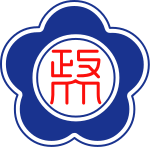國立政治大學 (Chinese) | |||||||||||||
 Seal of National Chengchi University | |||||||||||||
Other name | National University of Governance | ||||||||||||
|---|---|---|---|---|---|---|---|---|---|---|---|---|---|
Former names |
| ||||||||||||
| Motto | |||||||||||||
Motto in English | Harmony, Independence, Balance, and Preeminence[2] | ||||||||||||
| Type | Public Research higher education institution | ||||||||||||
| Established | 20 May 1927 | ||||||||||||
Religious affiliation | Non-sectarian | ||||||||||||
Academic affiliation | Association of National Universities, Republic of China | ||||||||||||
| Endowment | NTD 6,708,544,000.00 | ||||||||||||
Officer in charge | Pan Wen-chung (Minister of Education) | ||||||||||||
| President | Li Tsai-Yen | ||||||||||||
| Vice-president | Chen Shu-Heng Chan Chih-Yu Tsai Wei-Chi | ||||||||||||
| Provost | Lin Chi-Ping | ||||||||||||
Academic staff | 657[1] | ||||||||||||
Administrative staff | 170[1] | ||||||||||||
| Students | 16,348[1] | ||||||||||||
| Undergraduates | 9,400[1] | ||||||||||||
| Postgraduates | 6,063[1] | ||||||||||||
| 885[1] | |||||||||||||
| Location | , Taiwan 24°59′13.17″N 121°34′30.80″E / 24.9869917°N 121.5752222°E | ||||||||||||
| Campus | Suburban, 103 ha (250 acres)[3] | ||||||||||||
| Language | Chinese and English | ||||||||||||
| Colors | Sky Blue, Earth Red, and Sun White (天青、地紅、日白) | ||||||||||||
| Nickname | Zhèngdà (政大) | ||||||||||||
Sporting affiliations | |||||||||||||
| Mascot | Griffin | ||||||||||||
| Website | nccu.edu.tw | ||||||||||||
| Chinese name | |||||||||||||
| Traditional Chinese | 國立政治大學 | ||||||||||||
| Simplified Chinese | 国立政治大学 | ||||||||||||
| |||||||||||||
| Alternative Chinese name | |||||||||||||
| Traditional Chinese | 國立中央政治大學 | ||||||||||||
| Simplified Chinese | 国立中央政治大学 | ||||||||||||
| |||||||||||||
| Central School of Governance | |||||||||||||
| Traditional Chinese | 中央政治學校 | ||||||||||||
| Simplified Chinese | 中央政治学校 | ||||||||||||
| |||||||||||||
| Central School of Cadre | |||||||||||||
| Traditional Chinese | 中央幹部學校 | ||||||||||||
| Simplified Chinese | 中央干部学校 | ||||||||||||
| |||||||||||||
National Chengchi University (Chinese: 國立政治大學; Pe̍h-ōe-jī: Kok-li̍p Chèng-tī Tāi-ha̍k; lit. 'National Political Science University') is a public research university in Taipei, Taiwan. The university is also considered as the earliest public service training facility of Taiwan. First established in Nanjing in 1927, the university was subsequently relocated to Taipei and resumed full operation in 1954 as the first re-established "National University" in Taiwan.
The university, abbreviated as NCCU, specializes in arts and humanities, mass media, linguistics and literature, social sciences, economics, management, politics, and international affairs.[9][10] It is the only publicly-funded university in Taiwan to provide courses in journalism, advertising, radio and television, diplomacy, and several languages that are not taught at other institutions in Taiwan. The name Chengchi (政治) means governance or politics, and refers to its founding in 1927 as a training institution for senior civil servants for the Nanjing Nationalist government of the Republic of China. The university has ties with academic institutions like Academia Sinica, National Yang Ming Chiao Tung University, National Taiwan University and the National Palace Museum.[11][12]
The NCCU is also a member of the University System of Taiwan and University Alliance in Talent Education Development (UAiTED).[13][2]
- ^ a b c d e f g "About NCCU". National Chengchi University (in Chinese). Archived from the original on 2019-01-22. Retrieved 2024-11-04.
- ^ a b "About NCCU". National Chengchi University. Archived from the original on 2017-11-16. Retrieved 2015-12-22.
- ^ "NCCU Campus". International MBA, College of Commerce. National Chengchi University. Archived from the original on 2015-12-23. Retrieved 2015-12-22.
- ^ "Harvard-Yenching Institute Partner Institutions in Asia". Harvard-Yenching Institute. Archived from the original on 2018-11-27. Retrieved 2018-11-27.
- ^ "Joint Economics Symposium of Five Leading East Asian Universities" (PDF). National University of Singapore. 2018-01-29. Archived (PDF) from the original on 2020-09-10. Retrieved 2018-12-10.
- ^ "Participating Institutions". Harvard Business School. Archived from the original on 2021-01-15. Retrieved 2018-11-26.
- ^ "Partners". IE School of Global Public Affairs. 2018. Archived from the original on 2021-01-15. Retrieved 2018-11-29.
- ^ "Member Schools". Graduate Business Forum. Archived from the original on 2021-01-15. Retrieved 2018-12-24.
- ^ "National Chengchi University". London: Times Higher Education. 2018. Archived from the original on 2021-01-15. Retrieved 2018-11-27.
One of Taiwan's most prestigious higher education institutions, the National Chengchi University is regarded as one of the Asia's most important centres for humanities and social sciences.
- ^ "Ranking of Top Universities in Greater China". Shanghai: ShanghaiRanking Consultancy. 2016. Archived from the original on 2020-10-09. Retrieved 2018-11-27.
- ^ "National Chengchi University, Taiwan (Exchange Program)". University of Connecticut. Mansfield, Connecticut. 2015. Archived from the original on 2015-06-14. Retrieved 2015-06-12.
National Chengchi University (NCCU), located in the capital city of Taipei, is a comprehensive public university, ranked first in Taiwan in the fields of social sciences, business, communication and international relations. It is also regarded as one of the best places in Taiwan to study Mandarin.
- ^ "National Chengchi University Rankings". QS Top Universities. London: QS Quacquarelli Symonds. 2015. Archived from the original on 2019-07-25. Retrieved 2015-12-22.
- ^ "National Chengchi University is joining UST in 2021". 中央社 Cna (in Chinese). Taipei City: Central News Agency. 2020-11-17. Archived from the original on 2020-11-22. Retrieved 2020-11-21.